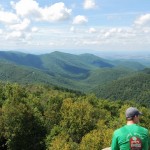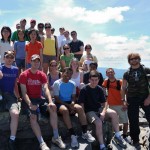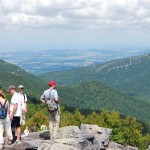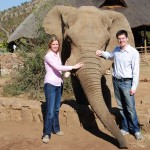Last weekend Kristy and I went whitewater rafting on the Gauley River with the Darden Outdoor Club. We left Charlottesville Thursday evening along with a group of 36 Darden students and partners, and drove three hours to the rafting site in West Virginia. That night we stayed in rustic cabins. I slept fine, thanks to the bonfire and associated socializing, although some of our group seemed a little weary in the morning.
- Survived Class V
- Kristy and Randall
- Colosseum
The big focus of this event was the Class V rapids on Friday. If you are not familiar with Whitewater Rafting, rapids are classified according to difficulty level. Wikipedia defines Class V as follows:
Class 5: Whitewater, large waves, large rocks and hazards, maybe a large drop, precise maneuvering (Skill Level: Advanced Whitewater Experience) (link)
Since about two thirds of our group had never been rafting before, many of us were a bit apprehensive Thursday evening and we all talked about what to expect the next day. The predominate term used to describe the coming experience was ‘intense’. Despite the build up, no one backed out and we were all in good spirits during breakfast on Friday (expect for Kristy who was white as a ghost).
After breakfast we rented wet suites, signed some crazy waiver, and hopped on a bus. On the way to the dam one of the guides gave a lecture on whitewater safety. Kristy and I were at the back of the bus and had trouble hearing, but caught some of the important elements like, ‘if you get caught under the raft and can’t breath you need to get out from under the raft’. There were also some tips such as, ‘hold on to your paddle so it doesn’t hit someone in the face’.
At the dam we formed groups of eight, picked our raft, and received more instruction from our guide. My group had the pleasure of being led down the river by Joe. During the winter Joe rents snowmobiles in Denver and in the fall he tells dirty jokes while leading groups on rafting trips down the Gauley River. Most of his jokes were amusing enough that we are still talking about them a week later. At the moment I can’t think of one that is fit for reprinting.
For all the hype the rapids didn’t seem too perilous. As you can see from the photo above, I was in high spirits after running our first Class V rapid. Shortly after this rapid, we ‘surfed’ a rapid, which is pretty much like what you would imagine. Our raft came close to flipping and everyone fell out except for Kristy, me, and our guide. I think Joe was a little disappointed with this outcome, compared to his most desired outcome of being the only person left in the raft. He later referred to our situation as a lack of team spirit, since we didn’t all fall out of the raft together as a team. At the end of the trip this was rectified when Joe flipped our raft – we all went in together.
Running the river was a great experience. We used Class VI as our outfitters and they were awesome. The guides were fun and safe, and the food was great. Also, going with my classmates was much more fun than this trip would have been outherwise. Thanks go out to Andy Shipley and the rest of the Outdoor Club officers that made this event possible.










